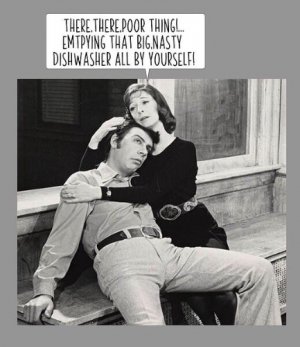grahamg
Old codger
- Location
- South of Manchester, UK
The conventional wedding vows as we all know go like this:
""In the name of God, I, _____, take you, _____, to be my (wife/husband), to have and to hold from this day forward, for better, for worse, for richer, for poorer, in sickness and in health, to love and to cherish, until parted by death."
Here are some views on the topic:
https://www.biola.edu/blogs/good-bo...hat-is-the-meaning-of-for-better-or-for-worse
Quote:
"Just think about the meaning of the words in our wedding vows—“for better or for worse . . . in plenty and in want . . . in joy and in sorrow . . .in sickness and in health . . . as long as we both shall live.” What a commitment we make in that moment of time, with “God and these witnesses” listening! Are these just empty words of tradition, or do they represent a genuine promise of commitment? The longevity and quality of your marriage depends upon it!
Commitment is a mindset . . . an attitude . . . a way of thinking that will enable you and your spouse to navigate through the still waters and the storms of a marriage relationship. Charles Swindoll (Strike the Original Match) compares working on marriage to remodeling a house:
It takes longer than you planned
It costs more than you figured
It is messier than you anticipated
It requires greater determination than you expected
Sometimes the only thing that keeps us going is hope!
(Break)
"Here are just a few factors that may be present in any marriage that undermine unconditional commitment:
""In the name of God, I, _____, take you, _____, to be my (wife/husband), to have and to hold from this day forward, for better, for worse, for richer, for poorer, in sickness and in health, to love and to cherish, until parted by death."
Here are some views on the topic:
https://www.biola.edu/blogs/good-bo...hat-is-the-meaning-of-for-better-or-for-worse
Quote:
"Just think about the meaning of the words in our wedding vows—“for better or for worse . . . in plenty and in want . . . in joy and in sorrow . . .in sickness and in health . . . as long as we both shall live.” What a commitment we make in that moment of time, with “God and these witnesses” listening! Are these just empty words of tradition, or do they represent a genuine promise of commitment? The longevity and quality of your marriage depends upon it!
Commitment is a mindset . . . an attitude . . . a way of thinking that will enable you and your spouse to navigate through the still waters and the storms of a marriage relationship. Charles Swindoll (Strike the Original Match) compares working on marriage to remodeling a house:
It takes longer than you planned
It costs more than you figured
It is messier than you anticipated
It requires greater determination than you expected
Sometimes the only thing that keeps us going is hope!
(Break)
"Here are just a few factors that may be present in any marriage that undermine unconditional commitment:
- Self-centeredness and stubbornness. Put simply, we are sinners, and central to our sinfulness is the choice of self-gratification. Several years ago a young man shared his personal story with an adult Sunday School group I was teaching. He had asked my permission to “bare his soul” before his friends. He shared that he had been having an affair for two years, and had now repented before the Lord and was seeking the forgiveness of his wife. You could have heard a pin drop in the room as we were all asked to become an “accountability group” for this young man. Their marriage was restored, and his story revealed that his own selfishness, self-gratification, and stubbornness had been at the root of the problem. Only commitment to his wife brought them back to a healthy marriage.
- Spiritual and Emotional “baggage” from the past. Past experiences, especially unresolved sins or habit patterns, will haunt any marriage relationship and prevent intimacy and commitment. Bitterness toward God or others . . . inability to fully know forgiveness for a past sin . . . all of these emotional/spiritual handicaps will seriously limit the depth of commitment we can make. We must deal with these before God, and sometimes the help of a skilled Christian counselor can be just the thing we need.
- Lack of clarity about the true meaning of marriage. This is another kind of “baggage.” If you have never seen an example of a healthy marriage, either in family or friendship circles, you will have a difficult time finding that for yourself.
- Busy-ness. Most couples do not allow enough meaningful time spent together to nurture their commitment.
- Poor communication skills. I want to elaborate more on this point in my next blog, but commitment includes expression to your spouse. How I do that (or fail to do so) is crucial in a healthy marriage.


